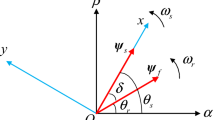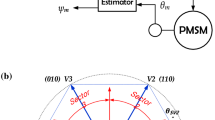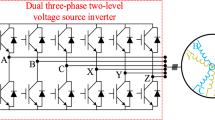Abstract
Severe torque ripple and determination of the weighting factor pose significant challenges in traditional predictive torque control. A deadbeat predictive torque control scheme designed to minimize torque ripple for dual three-phase permanent magnet synchronous motors is proposed in this paper, eliminating the need for a cost function. Additionally, a novel method for calculating action time based on geometric principles is proposed. First, the deadbeat direct torque and flux control is employed to obtain the reference voltage vector. To reduce the computational burden, the nearest virtual voltage vector is selected directly without a cost function. Subsequently, the torque ripple is further reduced by calculating the corresponding action time based on the introduced geometric relationship in the volt-sec coordinate system. Finally, experimental results demonstrate the effectiveness of the torque ripple reduction method under different working conditions.











Similar content being viewed by others
References
Duran, M., Levi, E., Barrero, F.: Multiphase Electric Drives. Introduction, pp. 1–26. Wiley, New York (2017)
Levi, E.: Advances in converter control and innovative exploitation of additional degrees of freedom for multiphase machines. IEEE Trans. Industr. Electron. 63(1), 433–448 (2016)
Hu, S., Liang, Z., Zhang, W., et al.: Research on the integration of hybrid energy storage system and dual three-phase pmsm drive in ev. IEEE Trans. Industr. Electron. 65(8), 6602–6611 (2018)
Jung, E., Yoo, H., Sul, S.K., et al.: A nine-phase permanent-magnet motor drive system for an ultrahigh-speed elevator. IEEE Trans. Ind. Appl. 48(3), 987–995 (2012)
Che, H.S., Levi, E., Jones, M., et al.: Operation of a six-phase induction machine using series-connected machine-side converters. IEEE Trans. Industr. Electron. 61(1), 164–176 (2014)
Aissa, O., Moulahoum, S.C., et al.: Analysis and experimental evaluation of shunt active power filter for power quality improvement based on predictive direct power control. Environ. Sci. Pollut. Res. 25(25), 24548–24560 (2018)
Bouafassa, A., Rahmani, L., Babes, B., Bayindir, R.: Experimental design of a finite state model predictive control for improving power factor of boost rectifier. In: 2015 IEEE 15th International Conference on Environment and Electrical Engineering (EEEIC), pp. 1556–1561. Rome, Italy (2015)
Babes, B., Hamouda, N., Kahla, S., Amar, H., Ghoneim, S.S.M.: Fuzzy model-based multivariable predictive control design for rapid and efficient speed-sensorless maximum power extraction of renewable wind generators. Electr. Eng. Electromech. 3, 51–62 (2022)
Hamouda, N., Babes, B., Kahla, S., Soufi, Y., Petzoldt, J., & Ellinger, T.: Predictive control of a grid connected PV system incorporating active power filter functionalities. In: 2019 1st International Conference on Sustainable Renewable Energy Systems and Applications (ICSRESA), Tebessa, Algeria, pp. 1–6 (2019)
Rodriguez, J., Kennel, R.M., Espinoza, J.R., et al.: High-performance control strategies for electrical drives: An experimental assessment. IEEE Trans. Industr. Electron. 59(2), 812–820 (2012)
Alsofyani, I.M., Lee, K.B.: Enhanced performance of constant frequency torque controller–based direct torque control of induction machines with increased torque-loop bandwidth. IEEE Trans. Ind. Electron. 67(12), 10168–10179 (2020)
Hamouda, N., Babes, B., Kahla, S., Soufi, Y.: Real-time implementation of grid-connected wind energy systems: predictive current controller. In: 2019 1st International Conference on Sustainable Renewable Energy Systems and Applications (ICSRESA), Tebessa, Algeria, pp. 1–6 (2019)
Jarzebowicz, L.: Impact of low switching-to-fundamental frequency ratio on predictive current control of PMSM: a simulation study. In: 2018 25th International Workshop on Electric Drives: Optimization in Control of Electric Drives (IWED), Moscow, Russia, pp. 1–5 (2018)
Luo, Y., Liu, C.: A simplified model predictive control for a dual three-phase pmsm with reduced harmonic currents. IEEE Trans. Ind. Electron. 65(11), 9079–9089 (2018)
Yu, B., Song, W., Guo, Y., et al.: Virtual voltage vector-based model predictive current control for five-phase vsis with common-mode voltage reduction. IEEE Trans. Transp. Electrif. 7(2), 706–717 (2021)
Yang, G., Yang, J., Li, S., et al.: A sequential direct torque control scheme for seven-phase induction machines based on virtual voltage vectors. IEEE Trans. Ind. Appl. 57(4), 3722–3734 (2021)
Gonzalez-Prieto, I., Duran, M.J., Aciego, J.J., et al.: Model predictive control of six-phase induction motor drives using virtual voltage vectors. IEEE Trans. Ind. Electron. 65(1), 27–37 (2018)
Zhang, Y., Yang, H.: Model predictive torque control of induction motor drives with optimal duty cycle control. IEEE Trans. Power Electron. 29(12), 6593–6603 (2014)
Zhou, Z., Xia, C., Shi, T., et al.: Model predictive direct duty-cycle control for pmsm drive systems with variable control set. IEEE Trans. Ind. Electron. 68(4), 2976–2987 (2021)
Amiri, M., Milimonfared, J., Khaburi, D.A.: Predictive torque control implementation for induction motors based on discrete space vector modulation. IEEE Trans. Ind. Electron. 65(9), 6881–6889 (2018)
Wang, Y., Wang, X., Xie, W., et al.: Deadbeat model-predictive torque control with discrete space-vector modulation for PMSM drives. IEEE Trans. Ind. Electron. 64(5), 3537–3547 (2017)
Kang, J.K., Sul, S.K.: New direct torque control of induction motor for minimum torque ripple and constant switching frequency. IEEE Trans. Ind. Appl. 35(5), 1076–1082 (1999)
Zhang, Y., Zhu, J.: Direct torque control of permanent magnet synchronous motor with reduced torque ripple and commutation frequency. IEEE Trans. Power Electron. 26(1), 235–248 (2011)
Luo, Y., Liu, C.: Model predictive control for a six-phase pmsm motor with a reduced-dimension cost function. IEEE Trans. Ind. Electron. 67(2), 969–979 (2020)
Zhang, X., Hou, B.: Double vectors model predictive torque control without weighting factor based on voltage tracking error. IEEE Trans. Power Electron. 33(3), 2368–2380 (2018)
Anuchin, A., Aliamkin, D., Lashkevich, M., Podzorova, V., Aarniovuori, L., Kennel, R.: Model predictive control with reduced integration step size for continuous control of an IPM motor. In: 2019 IEEE International Symposium on Predictive Control of Electrical Drives and Power Electronics (PRECEDE), Quanzhou, China, pp. 1–6 (2019)
Kodumur Meesala, R.E., Kunisetti, V.P.K., Kumar Thippiripati, V.: Enhanced predictive torque control for open end winding induction motor drive without weighting factor assignment. IEEE Trans. Power Electron. 34(1), 503–513 (2019)
Lin, X., Huang, W., Jiang, W., et al.: Predictive torque control for pmsm based on weighting factor elimination and fast voltage vector selection. IEEE J. Emerg. Select. Top. Power Electron. 8(4), 3736–3750 (2020)
Zhao, Y., Lipo, T.A.: Space vector PWM control of dual three-phase induction machine using vector space decomposition. IEEE Trans. Ind. Appl. 31(5), 1100–1109 (1995)
Lee, J.S., Choi, C.H., Seok, J.K., et al.: Deadbeat-direct torque and flux control of interior permanent magnet synchronous machines with discrete time stator current and stator flux linkage observer. IEEE Trans. Ind. Appl. 47(4), 1749–1758 (2011)
Luo, Y., Liu, C.: Elimination of harmonic currents using a reference voltage vector based-model predictive control for a six-phase pmsm motor. IEEE Trans. Power Electron. 34(7), 6960–6972 (2019)
Li, X., Xue, Z., Yan, X., Zhang, L., Ma, W., Hua, W.: Low-complexity multivector-based model predictive torque control for PMSM with voltage preselection. IEEE Trans. Power Electron. 36(10), 11726–11738 (2021)
Acknowledgements
This study is supported by Shanghai Natural Science Foundation under Grant 19ZR1418600.
Author information
Authors and Affiliations
Corresponding author
Rights and permissions
Springer Nature or its licensor (e.g. a society or other partner) holds exclusive rights to this article under a publishing agreement with the author(s) or other rightsholder(s); author self-archiving of the accepted manuscript version of this article is solely governed by the terms of such publishing agreement and applicable law.
About this article
Cite this article
Wang, S., Zhang, Y., Zhao, J. et al. Geometric principle-based deadbeat predictive control with low-torque ripple for dual three-phase permanent magnet synchronous motors. J. Power Electron. (2024). https://doi.org/10.1007/s43236-024-00813-5
Received:
Revised:
Accepted:
Published:
DOI: https://doi.org/10.1007/s43236-024-00813-5




